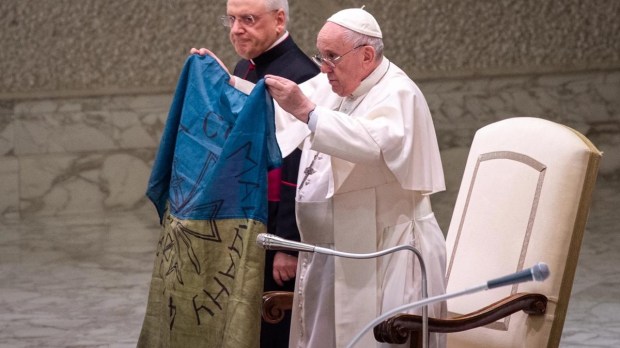Following the controversy sparked by the Pope's statements to the 10th National Meeting of Young Catholics in Russia on August 25, 2023, the Holy See issued a statement on August 29. The text explains that the Pope only referred to "the great Russia of Peter I and Catherine II" in order to provide historical points of reference, and not to justify the imperialist rhetoric used by the current authorities of the Russian Federation to justify the invasion of Ukraine.
Promoting Russian heritage
"The Pope's intention was to encourage young people to preserve and promote what is positive in the great Russian cultural and spiritual heritage, and not of course to exalt imperialist ways of thinking and government figures, cited to indicate certain historical periods of reference," said the director of the Holy See Press Office, Matteo Bruni.
The written transcript of the event, published by the Holy See on August 26, relayed only relatively uncontroversial remarks. The Pope invited young Russian Catholics in particular "to be sowers, to sow seeds of reconciliation, tiny seeds that in this winter of war will not germinate for the moment on frozen ground, but in a future spring will flourish."
But an improvisation by Pope Francis, not in the transcription, appears in the recording of this video conference meeting with young Russian Catholics gathered in St. Petersburg. “Never forget your heritage. You are the heirs of great Russia: the great Russia of saints, of leaders, the great Russia of Peter I, of Catherine II, of this great empire, of this enlightened country, of great culture and great humanity,” the Pope said, addressing the young people.
"Never abandon this heritage. You are the heirs of the great Mother [matushka] Russia, go forward carrying this," Francis added, thanking these young Catholics for their "way of being citizens of Russia."
Unease over the Pope's remarks
The Pope's remarks have sparked deep unease in Ukraine and in circles close to the Russian opposition, who accuse him of using language similar to that of Patriarch Kirill and the Kremlin. Indeed, Russian President Vladimir Putin has regularly referred to this theme of "Great Russia" and the legacy of Tsar Peter I The Great, in power from 1682 to 1725, to justify the invasion of Ukraine.
"We assume that His Holiness's words were uttered spontaneously, without any pretension of historical evaluation, nor any intention of supporting Russia's imperialist ambitions. Nevertheless, we share the great sadness aroused by his remarks," said His Beatitude Sviatoslav Shevchuk, Major Archbishop of the Ukrainian Greek Catholic Church and regular interlocutor of Pope Francis.
For its part, the Apostolic Nunciature in Ukraine, which is one of the few embassies to have remained in Kiev since the start of the Russian offensive, assures us that Pope Francis "is a fervent opponent and critic of any form of imperialism or colonialism, whatever the people or situation."

Questions about Francis' stance on Russia
Since the start of Russia's large-scale offensive in Ukraine on February 24, 2022, Pope Francis has called for prayers for "martyred Ukraine" at essentially every public address.
Still, at times he seems to relativize Moscow's responsibility. In his May 3, 2022, interview with Corriere della Sera, his reference to "NATO barking at the gates of Russia" seemed to echo a Kremlin argument, even though the Pope attributed this expression to an unnamed European head of government.
The Holy Father has often made it clear that he sees those on both sides of the war as members of the human family. He chose to have a Russian woman and a Ukrainian woman carry the cross together at the Good Friday Via Crucis, though after this sparked controversy in Ukraine, it was decided that they would not speak, and walk together in silence.
At the general audience on August 24, 2022, the Argentine Pontiff provoked heated diplomatic tension with Kiev by paying tribute to the far-right activist Daria Douguina, killed in an attack. He hailed her as an innocent victim of war, speaking of "an unfortunate young woman who died because of a bomb under the seat of her car in Moscow." The Ukrainian Foreign Minister, Dmytro Kuleba, declared that the Pope's statements had “broken Ukraine's heart.”
Here too, the Holy See chose to address the situation a few days later. "The Holy Father's words on this dramatic subject should be read as a voice raised in defense of human life and the values associated with it, and not as a political position," the Holy See's Secretariat of State said in a statement issued on August 30, 2022.
Condemning the war
"As for the large-scale war in Ukraine, unleashed by the Russian Federation, the Holy Father's interventions are clear and unequivocal in condemning it as morally unjust, unacceptable, barbaric, senseless, repugnant, and sacrilegious," the statement added, employing far more confrontational language than that of Pope Francis.
"I think it will be recognized in retrospect that he was right to keep his distance from both sides," a papal diplomat told I.MEDIA. He pointed out that Ukraine, a country that has suffered repeated aggression, had no prospect of peace even before the invasion.
In this context, the Pope "cannot sit idly by and wait" and is therefore "continually launching appeals for peace," notably through Cardinal Zuppi's mission. "It is the greatness of Pope Francis that he tries everything," adds this source.



